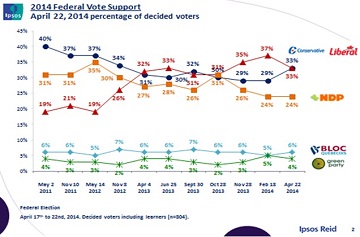Tories (33%), Liberals (33%) All Tied Up for First Time
Since Fall 2013
In May 2013, following the election of Justin Trudeau as Liberal leader, the Liberals catapulted ahead of the Tories. For September and October the two parties were essentially tied, never drifting more than two points away from each other, but throughout the entire winter the Liberals held a lead - but not anymore.
Moreover, the poll finds that a minority (23%) of Canadians are following the Fair Elections Act closely, that most (87%) believe requiring voters to prove their identity is reasonable, and that most (70%) believe it is acceptable to eliminate the practise of vouching, which appears to be in stark contrast to the staunch opposition towards the bill by the media and academic communities.
If an election were held tomorrow, the Conservative Party led by Prime Minister Stephen Harper would receive 33% support among decided voters, up 4 points since February and the highest they've been since an Ipsos poll in late 2012. The Liberals under Justin Trudeau would also receive 33% support, down 4 points. The NDP, led by Thomas Mulcair, would receive 24% of the vote, unchanged, while Elizabeth May's Green Party would garner 3% of the vote, and the Bloc 6% nationally, up 1 point (24%of the vote in Quebec). Nearly two in ten (16%) Canadians are undecided.
- Within Quebec, where the provincial Liberals recently swept to power with a majority government, the federal Liberals are also ahead at 37% support, followed by the NDP (28%) and the Bloc (24%), while the Tories' struggles continue (9%).
- In seat-rich Ontario, the Tories (36%) and Grits (34%) are in a tight battle, followed by the NDP (27%) and Green Party (4%).
- In BC, the Tories (41%) have a lead over the NDP (27%) and Liberals (25%), while the Green Party trails (7%).
Likely Voters Tell Similar Story...
Examining vote support among the 56% of Canadians who say that `nothing short of an unforeseen emergency could stop me from getting to the voting booth and casting my vote' on Election Day, the Conservatives nudge up 1 point to 34% support, while support for the Liberals (33%, unchanged), NDP (24%, unchanged), Bloc (5%, down 1 point), and Greens (3%, unchanged) is also relatively unchanged.
Fair Elections Act a Snoozer, yet Provisions are Broadly Supported...
The media and academic communities have largely panned the Tories' Fair Elections Act, but a new Ipsos Reid poll reveals that most Canadians are supportive of its provisions.
Few (23%) Canadians say they're following the Act and ensuing debate `closely' (6% very/17% somewhat), while most are not (42% not at all/35% not very closely). Even among those with a university degree, only 41% are following the issue, while a majority (59%) are not.
Most (87%) Canadians believe it is `reasonable' (65% very/21% somewhat) to `require someone to prove their identity and address before they are allowed to vote', while just 13% of Canadians believe it is `unreasonable'.
Under the old Elections Act, someone without proper ID was allowed to vote if another person who was qualified to vote signed an oath on election day saying that the person without ID was who they said they were. This process is called vouching. Under the new Elections Act, vouching will no longer be allowed.
Seven in ten (70%) believe it is `acceptable' to `eliminate vouching and require voters to personally prove their identity and address before they are allowed to vote', while three in ten (30%) maintain that it is `unacceptable' to remove this practice. In fact, a majority of supporters of the Conservatives (84%), Bloc (79%), Liberals (67%) and NDP (66%) support the elimination of vouching.
Majority (61%) Disagrees that Elimination of Vouching is a Conservative Scheme...
Some have argued that the Fair Elections Act, and eliminating vouching in particular, is a move by the Harper government to systemically disenfranchise voters who disproportionately vote for other parties, such as students and others who find it difficult to prove residence.
On this point, six in ten (61%) Canadians `disagree' (33% strongly/28% somewhat) that `eliminating vouching is really just a scheme by the Harper Conservatives to disqualify people who would vote against them from voting in the next election'. Four in ten (39%), though, `agree' (15% strongly/23% somewhat) that it is a scheme.
Interestingly, Canadians are split on whether the elimination of vouching will `unfairly take the vote away from people like students and the poor who may have a harder time proving where they live'. One half (52%) `agrees' (21% strongly/31% somewhat) that it will make it more difficult for these people to vote; the other half (48%) `disagrees' (21% strongly/28% somewhat) that it will be more difficult.
That most Canadians support the elimination of vouching, yet half believe it will make it more difficult for some to vote, is likely explained by this fact: 86% of Canadians `agree' (58% strongly/28% somewhat) that `requiring voters to personally prove who they are and where they live is essential to eliminating potential fraud in our electoral system'. Just one in ten (14%) `disagrees' (6% strongly/8% somewhat) with this premise.
These are some of the findings of an Ipsos Reid poll conducted between April 17th to 22nd, 2014 on behalf of CTV News. For this survey, a sample of 1,014 Canadians from Ipsos' Canadian online panel was interviewed online. Weighting was then employed to balance demographics to ensure that the sample's composition reflects that of the adult population according to Census data and to provide results intended to approximate the sample universe. The precision of Ipsos online polls is measured using a credibility interval. In this case, the poll is accurate to within +/- 3.5 percentage points had all Canadians adults been polled. All sample surveys and polls may be subject to other sources of error, including, but not limited to coverage error, and measurement error.
For more information on this news release, please contact:
John Wright
Senior Vice President
Ipsos Reid
Public Affairs
416.324.2002
[email protected]
About Ipsos Reid
Ipsos Reid is Canada's market intelligence leader, the country's leading provider of public opinion research, and research partner for loyalty and forecasting and modelling insights. With operations in eight cities, Ipsos Reid employs more than 600 research professionals and support staff in Canada. The company has the biggest network of telephone call centres in the country, as well as the largest pre-recruited household and online panels. Ipsos Reid's marketing research and public affairs practices offer the premier suite of research vehicles in Canada, all of which provide clients with actionable and relevant information. Staffed with seasoned research consultants with extensive industry-specific backgrounds, Ipsos Reid offers syndicated information or custom solutions across key sectors of the Canadian economy, including consumer packaged goods, financial services, automotive, retail, and technology & telecommunications. Ipsos Reid is an Ipsos company, a leading global survey-based market research group.
To learn more, please visit www.ipsos.ca.
About Ipsos
Ipsos is an independent market research company controlled and managed by research professionals. Founded in France in 1975, Ipsos has grown into a worldwide research group with a strong presence in all key markets. Ipsos ranks third in the global research industry.
With offices in 86 countries, Ipsos delivers insightful expertise across six research specializations: advertising, customer loyalty, marketing, media, public affairs research, and survey management.
Ipsos researchers assess market potential and interpret market trends. They develop and build brands. They help clients build long-term relationships with their customers. They test advertising and study audience responses to various media and they measure public opinion around the globe.
Ipsos has been listed on the Paris Stock Exchange since 1999 and generated global revenues of e1,712,4 million (2 274 M$) in 2013.
Visit www.ipsos.com to learn more about Ipsos' offerings and capabilities.




